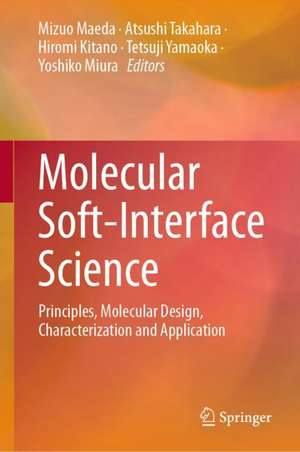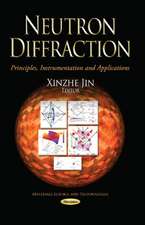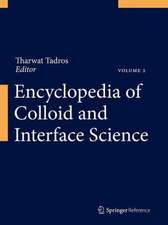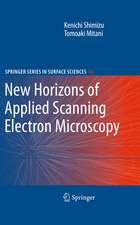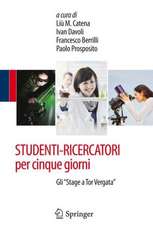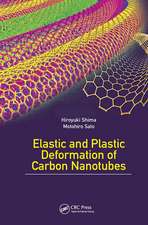Molecular Soft-Interface Science: Principles, Molecular Design, Characterization and Application
Editat de Mizuo Maeda, Atsushi Takahara, Hiromi Kitano, Tetsuji Yamaoka, Yoshiko Miuraen Limba Engleză Hardback – 17 mai 2019
Preț: 643.48 lei
Preț vechi: 757.04 lei
-15% Nou
Puncte Express: 965
Preț estimativ în valută:
123.14€ • 133.72$ • 103.44£
123.14€ • 133.72$ • 103.44£
Carte tipărită la comandă
Livrare economică 22 aprilie-06 mai
Preluare comenzi: 021 569.72.76
Specificații
ISBN-13: 9784431568759
ISBN-10: 4431568751
Pagini: 250
Ilustrații: VIII, 222 p. 138 illus., 43 illus. in color.
Dimensiuni: 155 x 235 mm
Greutate: 0.5 kg
Ediția:1st ed. 2019
Editura: Springer
Colecția Springer
Locul publicării:Tokyo, Japan
ISBN-10: 4431568751
Pagini: 250
Ilustrații: VIII, 222 p. 138 illus., 43 illus. in color.
Dimensiuni: 155 x 235 mm
Greutate: 0.5 kg
Ediția:1st ed. 2019
Editura: Springer
Colecția Springer
Locul publicării:Tokyo, Japan
Cuprins
1. The principle and physical chemistry of soft interface.- 2. Molecular Design of Soft Interface.- 3. Nano- and micro-technology of Soft Interface.- 4. Infrared and Raman spectroscopy for thin film analysis .- 5. Sum Frequency Generation (SFG).- 6. Surface Analysis.- 7. Scattering and Reflection.- 8. X-ray and neutron reflectivity and grazing incidence X-ray diffraction.- 9 . Scanning Electron Microscopy.- 10. Transmission Electron Microscopy.- 11. Scanning Probe Microscopy (SPM).- 12. High-performance interface.- 13. Bio- and chemical-sensors and role of soft interface.- 14. Non-protein-fouling, hemocompatible and biospecific surfaces generated with phospholipid polymers.- 15. Stem cell purification on a cell-compatible, cell-specific biointerface.
Notă biografică
Mizuo Maeda
Mizuo Maeda received his Ph.D. from the University of Tokyo (1983). He was a full professor of materials physics and chemistry at Kyushu University before moving to RIKEN Institute as a chief scientist and a director of Bioengineering Laboratory. His research interests center on polymer chemistry, analytical chemistry, and biomaterials science.
Atsushi Takahara
Atsushi Takahara earned his D.Eng. (1983) in the field of polymer science. Since 1999, he is a full professor of Kyushu University. His research interests are focused on advanced soft materials such as polymer ultrathin films, polymer nanocomposites, and novel tough polymers.
Hiromi Kitano
Hiromi Kitano is a director of the Institute for Polymer-Water Interfaces (Toyama, Japan). He earned his Dr. Eng. in Kyoto University (1980). He was a full professor of University of Toyama from 1992 to2016. His research interests are focused on the structure analyses of water in the vicinity of polymer materials, development and application of biocompatible polymers, and analyses of molecular recognition processes at the interfaces of water-polymer materials.
Tetsuji YAMAOKA
Tetsuji YAMAOKA is a director of Department of Biomedical Engineering of National Cerebral and Cardiovascular Center Research Institute (Osaka Japan). He earned his Dr. Eng. in Kyoto University (1993). He is a Fellow of Biomaterials Science and Engineering (FBSE) and Japanese Delegate of the International Union of Societies for Biomaterials Science and Engineering. His research interests are cardiovascular artificial organs, regenerative medicines, and molecular imaging.
Yoshiko Miura Yoshiko Miura is a Professor at Kyusyu University. She received her B. Eng. Degree in 1995, M. Eng. Degree in 1997, and Dr. Eng. Degree in 2000 from the Kyoto University. She was appointed Assistant Professor at Nagoya University in 2001, Associate Professor at JAIST in 2005, and Professor at Kyushu University in 2010. Her research interests are biomaterial fabrication with glycopolymers and glyco-nanoparticles.
Mizuo Maeda received his Ph.D. from the University of Tokyo (1983). He was a full professor of materials physics and chemistry at Kyushu University before moving to RIKEN Institute as a chief scientist and a director of Bioengineering Laboratory. His research interests center on polymer chemistry, analytical chemistry, and biomaterials science.
Atsushi Takahara
Atsushi Takahara earned his D.Eng. (1983) in the field of polymer science. Since 1999, he is a full professor of Kyushu University. His research interests are focused on advanced soft materials such as polymer ultrathin films, polymer nanocomposites, and novel tough polymers.
Hiromi Kitano
Hiromi Kitano is a director of the Institute for Polymer-Water Interfaces (Toyama, Japan). He earned his Dr. Eng. in Kyoto University (1980). He was a full professor of University of Toyama from 1992 to2016. His research interests are focused on the structure analyses of water in the vicinity of polymer materials, development and application of biocompatible polymers, and analyses of molecular recognition processes at the interfaces of water-polymer materials.
Tetsuji YAMAOKA
Tetsuji YAMAOKA is a director of Department of Biomedical Engineering of National Cerebral and Cardiovascular Center Research Institute (Osaka Japan). He earned his Dr. Eng. in Kyoto University (1993). He is a Fellow of Biomaterials Science and Engineering (FBSE) and Japanese Delegate of the International Union of Societies for Biomaterials Science and Engineering. His research interests are cardiovascular artificial organs, regenerative medicines, and molecular imaging.
Yoshiko Miura Yoshiko Miura is a Professor at Kyusyu University. She received her B. Eng. Degree in 1995, M. Eng. Degree in 1997, and Dr. Eng. Degree in 2000 from the Kyoto University. She was appointed Assistant Professor at Nagoya University in 2001, Associate Professor at JAIST in 2005, and Professor at Kyushu University in 2010. Her research interests are biomaterial fabrication with glycopolymers and glyco-nanoparticles.
Textul de pe ultima copertă
This book offers a comprehensive treatment of the molecular design, characterization, and physical chemistry of soft interfaces. At the same time, the book aims to encourage the fabrication of functional materials including biomaterials. During the past few decades there has been steady growth in soft-interface science, and that growth has been especially rapid in the twenty-first century. The field is interdisciplinary because it involves chemistry, polymer science, materials science, physical chemistry, and biology. Based on the increasing interdisciplinary nature of undergraduate and graduate programs, the primary goal of this present work is to serve as a comprehensive resource for senior-level undergraduates and for graduate students, particularly in polymer chemistry, materials science, bioconjugate chemistry, bioengineering, and biomaterials. Additionally, with the growing interest in the fabrication of functional soft materials, this book provides essential fundamental information for researchers not only in academia but also in industry.
Caracteristici
The first comprehensive, organized resource of soft-interface science Covers all aspects of the science such as basic properties of the soft interface of physical chemistry, characterization, and applications including biological materials Presents the advantages of materials development with soft interface to account for its major recent advances
